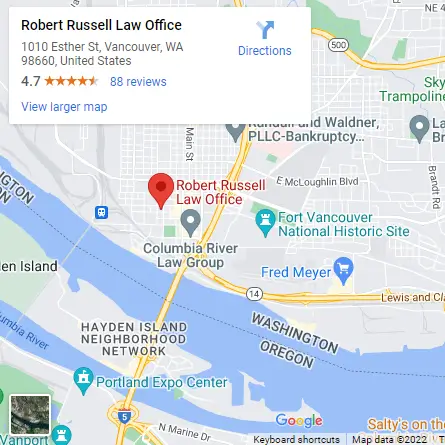It’s not comfortable contemplating your mortality. One thing that helps with coming to terms with death is making sure our loved ones are all cared for even after death. It should give you comfort knowing that your spouse, children, and grandchildren receive your hard-earned assets when you pass on or become incapacitated.
This is why it’s best to begin talking to an estate planning attorney as soon as possible. This pandemic is a time of uncertainty. Put your mind at ease by getting a will or a trust with a Vancouver estate planning attorney from the law office of Robert Russel.
This article will discuss the basic concepts you need to know when planning your estate.
What is estate planning?
Estate is just legalese for your possessions. An estate plan lists everything you have: cars, houses, bank accounts, and states what you want to be done with these. An estate plan lets you put in writing what you wish to be done to your assets and which loved one inherits what. Two ways you can go about estate planning is with a will or a trust.
What is a will?
 A will is an estate planning document which states in writing how you wish estate administration will be handled when you pass away. It’s simple, but a well-written will ensures that your property goes to the proper successor. Without this will, Washington intestate laws will determine who receives your property.
A will is an estate planning document which states in writing how you wish estate administration will be handled when you pass away. It’s simple, but a well-written will ensures that your property goes to the proper successor. Without this will, Washington intestate laws will determine who receives your property.
When administering a decedent’s will, it goes through what’s known as “probate.” During the probate process, your will is checked to ensure that it’s valid before your heirs receive their inheritance. Any disputes regarding your wishes will delay probate.
A sloppy will might pass on your property to someone you didn’t intend to. Experienced estate planning lawyers know how to draft a will to make it clear who gets what. If you don’t create a will, however, probate becomes much more expensive and much more difficult for your loved ones.
Aside from passing assets, a will also lets you name a person for guardianship of your children, as well as distribute proceeds of life insurance if the beneficiaries become deceased before you.
What is trust?
A trust is a fiduciary agreement between two parties: a trustor/grantor and a trustee. The trustor allows the trustee to hold the former’s assets for the benefit of the trustor’s beneficiaries. In the event of your death or incapacity, your beneficiaries will inherit these assets. A trust is its legal entity: this means that probate cannot change it because trust administration instructions are already in place.
The main benefit of getting a trust is avoiding probate. All different types of trust – revocable, irrevocable, living trusts, etc. – allows any beneficiary of yours to avoid the stress of facing probate in most cases. This means that your assets will be given to exactly whom you want them to, and they’ll get it much faster.
An estate planning lawyer will ensure that your trust can provide for your beneficiaries. Contact a Vancouver estate planning lawyer now!
Should I get a will or a trust?
Consider a will if you want inexpensive estate planning documents. Consider a trust if you want to avoid probate and have the money to spare.
Wills & trusts are not mutually exclusive. Wills and trusts work well in conjunction. A trust lets most of your assets reach your intended beneficiaries without the hassle of probate. A will covers what assets can’t be covered by the trust.
There are many ways to go about your estate plan. You can create something known as a pour-over will, which moves your assets to a trust when you die. You can also choose to create a living trust with the instructions from your will to move your assets upon passing away. Another option is to create a trust with the instructions from a will, known as a testamentary trust.
What is Power of Attorney (POA)?
A POA is a legal document that gives a person (agent) the power to make decisions on behalf of another person (principal). This can include having absolute or limited power to decide about the principal’s medical care, finances, or property. A POA is typically used when the principal is incapable of deciding by themselves or signing the documents.
Normal POAs end when the creator becomes incapacitated. A durable PA allows the agent to manage the principal’s affairs despite incapacity. A springing POA only takes effect when the creator becomes incapacitated.
Final Thoughts
Estate planning puts you at ease regarding your loved ones’ future upon your death. Whether it’s a will or a trust, it’s best to think about your estate plan as early as know. Experienced estate planning attorneys from the law firm of Robert Russel will help make sure that your beneficiaries receive your hard-earned estate. Schedule an initial consultation with a Vancouver estate lawyer now!







